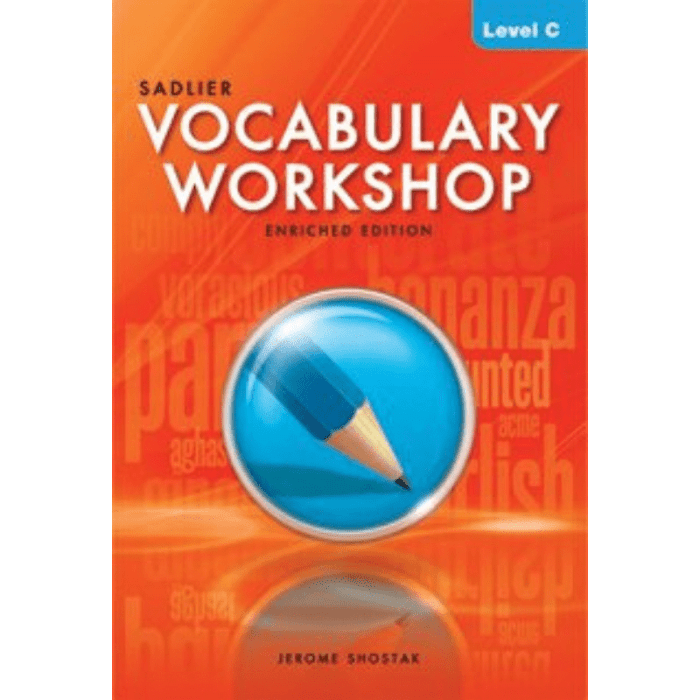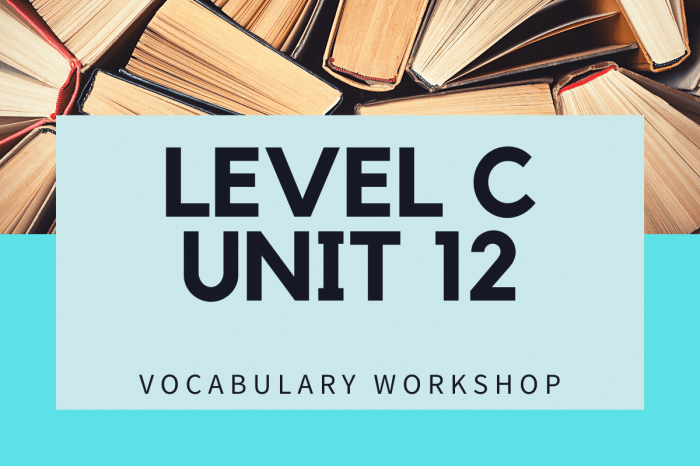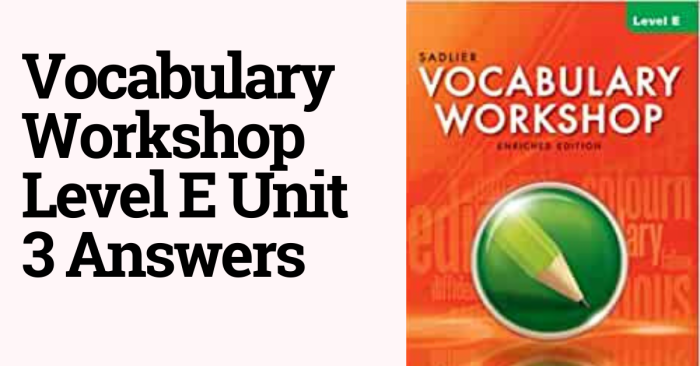Vocabulary workshop level c unit 12 choosing the right word – Embarking on a linguistic adventure with Vocabulary Workshop Level C Unit 12: Choosing the Right Word, we delve into the intricacies of word choice, exploring strategies for effective communication and expanding our vocabulary horizons.
Throughout this exploration, we will uncover the nuances of denotation and connotation, delve into the power of context, and unravel the mysteries of synonyms, antonyms, and word collocations. We will also illuminate the vibrant world of figurative language, discovering how similes and metaphors enhance our vocabulary and writing prowess.
Vocabulary Expansion

Expanding vocabulary is crucial for effective communication. Unit 12 introduces a range of vocabulary words that enrich students’ linguistic repertoire. These include words like “auspicious,” meaning favorable or promising; “ephemeral,” meaning lasting for a short time; and “incessant,” meaning continuous or never-ending.
Word Choice Strategies: Vocabulary Workshop Level C Unit 12 Choosing The Right Word
Word choice is influenced by denotation (literal meaning) and connotation (implied or associated meaning). Context plays a significant role in determining the appropriate word to use. For instance, in Unit 12, the word “humble” can have both a positive connotation (modest) and a negative connotation (lowly).
Synonyms and Antonyms, Vocabulary workshop level c unit 12 choosing the right word
Understanding synonyms (words with similar meanings) and antonyms (words with opposite meanings) enhances word choice. For example, synonyms for “beautiful” from Unit 12 include “lovely” and “exquisite,” while antonyms include “ugly” and “unattractive.”
| Vocabulary Word | Synonyms | Antonyms |
|---|---|---|
| auspicious | favorable, promising | unfavorable, discouraging |
| ephemeral | fleeting, transient | permanent, enduring |
| incessant | continuous, unending | intermittent, sporadic |
Word Collocations

Word collocations are combinations of words that frequently occur together. In Unit 12, examples include “make a decision,” “take a break,” and “have a discussion.” Using correct word collocations improves fluency and accuracy in speech and writing.
Figurative Language

Figurative language enhances vocabulary and writing. Unit 12 introduces similes (comparisons using “like” or “as”) and metaphors (direct comparisons). For instance, the simile “as happy as a clam” conveys a high level of contentment.
Word Usage in Context
Understanding word usage in context is essential. In Unit 12, the word “dilemma” is used in the context of a difficult choice: “She faced a dilemma: to accept the promotion or to stay in her current position.”
Vocabulary Building Activities
Crossword puzzles and word searches are engaging activities that reinforce vocabulary. Students can also create their own word lists or participate in discussions that encourage the use of new words.
Assessment and Evaluation

Assessing students’ vocabulary knowledge is crucial. This can be done through quizzes, essays, or presentations that require students to demonstrate their understanding and application of new vocabulary.
Essential Questionnaire
What is the significance of expanding vocabulary?
Expanding vocabulary is crucial for effective communication as it enhances our ability to express ourselves precisely, comprehend complex ideas, and engage in meaningful conversations.
How does context influence word choice?
Context plays a pivotal role in determining the appropriate word to use. The surrounding words, phrases, and sentences provide clues that guide us towards the most suitable word choice, considering both its denotation and connotation.
What is the difference between synonyms and antonyms?
Synonyms are words with similar meanings, while antonyms are words with opposite meanings. Understanding synonyms and antonyms expands our vocabulary and allows us to make more nuanced and precise word choices.